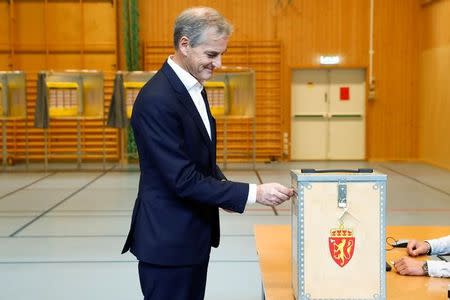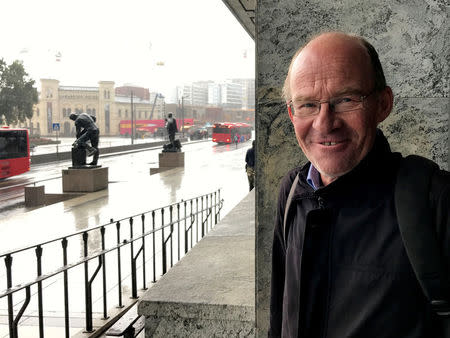Norway's right-wing government on track to keep power in vote-projections
By Henrik Stolen and Joachim Dagenborg OSLO (Reuters) - Norway's tax-cutting Conservative Prime Minister Erna Solberg seemed on track to keep power in an election on Monday, narrowly defeating a Labour-led opposition with promises of steady management of the oil-dependent economy, official projections showed. The ruling minority coalition of Solberg's Conservatives and the populist Progress Party, together with small centre-right allies, was set to win a tiny majority with 87 seats in the 169-seat parliament, according to the projection. A victory would be historic for Solberg, compared by her supporters to German Chancellor Angela Merkel, because no Conservative-led government has retained power in an election in Norway since 1985. Experts cautioned there were uncertainties with the forecasts by Norway's Directorate of Elections, which so far are based on 65 percent of the votes counted. And in fact for a few seconds the online projection flipped to show an opposition victory. "It's too early to conclude," Professor Elisabeth Ivarsflaten, an election expert at the University of Bergen told Reuters, underlining that many results from the larger cities were yet to come in. Solberg's supporters clapped and hugged each other when the first projections appeared on screens at 9 p.m. (1900 GMT). At a gathering for the Labour Party, led by former Foreign Minister Jonas Gahr Stoere, supporters fell suddenly quiet. "The government parties are holding their ground. The Conservative have had a very good election," Michael Tetzschner, a Conservative member of parliament, told Reuters. "We are in the phase of hoping and not believing too much." Solberg, 56, wants to cut taxes to boost growth. Stoere wants tax increases to improve public services such as education and healthcare for Norway's five million citizens. Norway is western Europe's biggest oil and gas producer and the industry could be affected, because Solberg will need support from two centre-right allies to ensure a majority. They include the Liberals, who want to limit exploration in Arctic waters. The Norwegian currency, the crown , strengthened slightly following the first projections after weakening sharply earlier in the day on weaker-than-expected inflation data. For much of the year, Labour and its allies were favoured by pollsters to win a clear victory, but support for the government has risen as the economy gradually recovered from a slump in the price of crude oil, Norway's top export. Unemployment, which a year ago hit a 20-year high of 5 percent, has since declined to 4.3 percent, while consumer confidence is at a 10-year high. Solberg has won credit for the upturn with a no-nonsense style of management. Norway's economy also has the cushion of a sovereign wealth fund worth almost $1 trillion, the world's biggest, built on income from offshore oil and gas. Labour, however, was set to remain the biggest party in Norway, with 50 seats ahead of the Conservatives on 44. Labour has been the biggest party in Norway since the 1920s. Stoere, who sometimes compares himself to French President Emmanuel Macron, took over the leadership of the Labour Party from Jens Stoltenberg, who left Norway to become NATO's secretary-general. Solberg's government has been a two-party a coalition of her Conservatives and the populist Progress Party, which has sharply limited immigration to Norway in what Stoere says is a betrayal of Norwegian values. Her embrace of the Progress Party as a junior partner has deterred some other smaller parties from formally joining the Conservatives in government. But Norway's problems are small by the standards of most nations. Apart from its sovereign wealth fund, Norway tops U.N. lists of the best country in which to live, based on issues such as personal earnings and education. It even rose to first, from fourth, in a 2017 survey that ranked nations by happiness. (Additional reporting by Terje Solsvik, Camilla Knudsen, Alister Doyle, Nerijus Adomaitis, Lefteris Karagiannopoulos and Gwladys Fouche; Writing by Terje Solsvik and Alister Doyle; Editing by Larry King)






